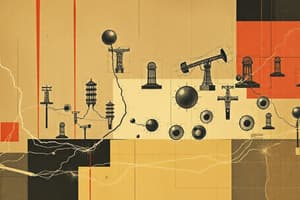Podcast
Questions and Answers
What component in an electric circuit measures the pressure behind the flow of electric current?
What component in an electric circuit measures the pressure behind the flow of electric current?
- Electron
- Voltage (correct)
- Power
- Resistance
Which type of charge is typically associated with electrons outside atomic nuclei?
Which type of charge is typically associated with electrons outside atomic nuclei?
- Proton charge
- Negative charge (correct)
- Neutral charge
- Positive charge
What is the unit used to measure resistance in an electric circuit?
What is the unit used to measure resistance in an electric circuit?
- Volt
- Ampere
- Watt
- Ohm (correct)
In an electric circuit, which factor represents the rate at which electrical energy is transferred?
In an electric circuit, which factor represents the rate at which electrical energy is transferred?
Which law is used to calculate power in an electric circuit?
Which law is used to calculate power in an electric circuit?
What creates an electrostatic force in an electric circuit?
What creates an electrostatic force in an electric circuit?
What differentiates batteries from capacitors in terms of storing electrical energy?
What differentiates batteries from capacitors in terms of storing electrical energy?
Why is copper wire commonly used in electrical circuits?
Why is copper wire commonly used in electrical circuits?
What is the purpose of fuses and circuit breakers in electrical systems?
What is the purpose of fuses and circuit breakers in electrical systems?
In electrical connections, why is it important to ensure minimal loss of signal or excessive resistance?
In electrical connections, why is it important to ensure minimal loss of signal or excessive resistance?
What foundational knowledge is essential for understanding electricity and circuits?
What foundational knowledge is essential for understanding electricity and circuits?
Which component does NOT rely on chemical reactions for storing electric energy?
Which component does NOT rely on chemical reactions for storing electric energy?
Flashcards are hidden until you start studying
Study Notes
Electricity and Circuit
Electric circuits involve moving electric charges from one place to another, often from a battery through a device like a light bulb back to the battery. Circuits can contain various components that control how electrical energy is used. Understanding electricity and circuitry is crucial because these principles drive all modern technology, such as computers and smartphones. Below are some fundamental concepts related to electricity and circuits:
Electric Charges
Electric charges exist as either positive or negative. Two types of charges have been identified based on their location:
- Positive charge - normally found within atoms' nuclei.
- Negative charge - usually associated with electrons outside atomic nuclei.
These two oppositely charged particles create an electrostatic force, which can attract or repel each other depending on their polarity.
Voltage, Resistance, and Power
In an electric circuit, voltage measures the pressure behind the flow of electric current. A higher voltage means more power pushing the current along. Resistance refers to the opposition to the flow of current; it is measured in ohms. Different materials offer varying levels of resistance when conducting electricity. Lastly, power is the rate at which electrical energy is transferred by an electric circuit. It is calculated using Ohm's law:
P = V² / R
where P is power in watts, V is voltage in volts, and R is resistance in ohms.
Electrical Energy Storage
Batteries store electrical energy and release it gradually over time. They consist of chemical reactions where energy is stored chemically in a rechargeable battery or a non-rechargeable disposable battery. Capacitors, meanwhile, do not rely on chemical reactions and instead use electrical double layers to store electric charge, releasing it quickly upon discharging.
Wiring and Connections
Wires play a critical role in transmitting electrical energy between different components in a circuit. Copper wire is commonly used due to its conductivity. Connections made between wires require some level of skill, ensuring minimal loss of signal or excessive resistance caused by poor connections.
Safety Considerations
Safety precautions must always be taken when working with electricity, especially high voltages, to avoid injury and damage to equipment. Fuses and circuit breakers prevent overloading of electrical circuits to protect both users and devices.
In conclusion, understanding electricity and circuits involves comprehending basic physics and engineering principles. This knowledge forms the foundation for generating and utilizing electric energy efficiently.
Studying That Suits You
Use AI to generate personalized quizzes and flashcards to suit your learning preferences.




